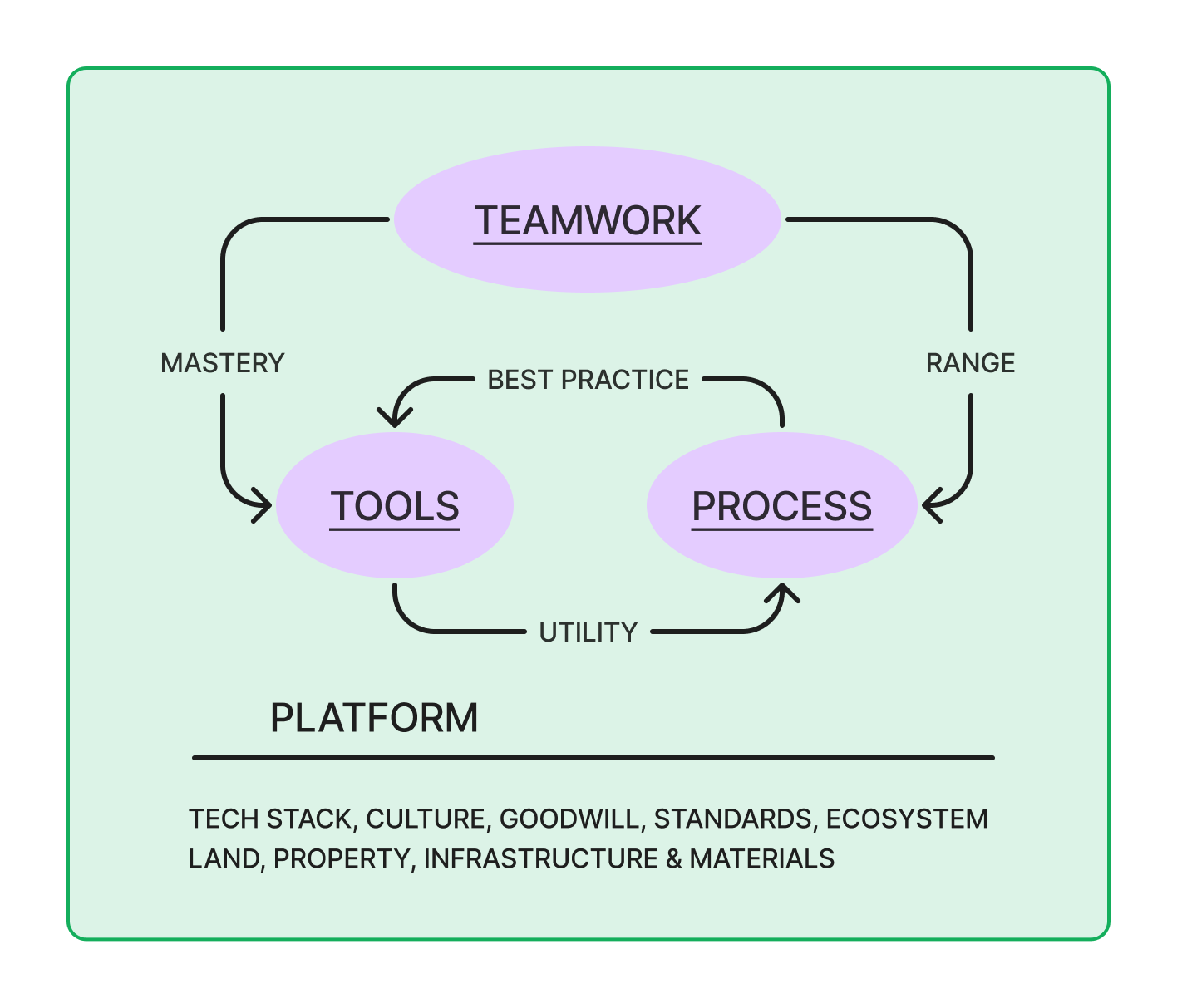Platform Engineer
Platform engineers power an organization's software development and delivery capabilities.
Platform engineering involves building and maintaining a company's internal developer platform, which provides self-service capabilities and tools to make developers more productive.
Related
Capabilities

- Teamwork
- Processes
- Tools
- Platform
Concept
Platform engineering has gained popularity as companies adopt cloud-native technologies and seek to enable developer self-service while maintaining governance and best practices.
- It aims to improve developer experience and efficiency by abstracting away infrastructure complexities and providing a golden path to production.
- Platform engineering teams build automated and reusable components, services, tools and workflows for the software delivery lifecycle.
Deliverables
Benefits should include faster time-to-market for applications, greater developer autonomy and productivity, and more consistency across dev and ops.
KPI Metrics
Deliverables are measured by:
- Scalability
- Reliability
- Performance
- Automation
Capabilities
A platform engineer should possess the following key capabilities and skills:
- Expertise in cloud technologies and infrastructure Platform engineers need deep knowledge of cloud platforms like AWS, Azure, or Google Cloud. They should know how to deploy, monitor, and manage applications and services on these platforms to effectively build and optimize the infrastructure.
- Proficiency in programming and scripting languages Coding skills in languages like Python, Java, or C++ are essential for platform engineers to develop and maintain the platform. Scripting expertise is also necessary to automate processes and manage infrastructure as code.
- Understanding of networking concepts and protocols Platform engineers should have a solid grasp of networking fundamentals, including TCP/IP, DNS, HTTP protocols, to configure network settings, set up firewalls, and ensure secure and stable connections.
- Knowledge of DevOps and CI/CD practices Familiarity with DevOps methodologies and implementing CI/CD pipelines is crucial for platform engineers to automate build, test, and deployment processes. They need to understand how to use relevant tools and ensure the successful implementation of these pipelines.
- Strong problem-solving and analytical skills Platform engineers must be able to diagnose complex issues by analyzing logs, examining error messages, and tracing code execution. They need to think critically and come up with effective solutions to maintain the platform's performance and reliability.
- Excellent communication and collaboration abilities As platform engineers work closely with various teams like software developers, data scientists, and stakeholders, they must possess strong interpersonal skills. They should be able to clearly communicate complex technical concepts, provide guidance, and facilitate collaboration.
- Continuous learning mindset The technology landscape is constantly evolving, so platform engineers need to stay updated with the latest tools, best practices, and industry trends. They should have a passion for learning and adapting to new technologies to continuously improve the platform.
- Customer-centric and product-focused approach Platform engineers should treat the platform as a product and the developers as their customers. They need to understand the developers' pain points, gather feedback, and continuously enhance the platform to provide a great user experience and drive adoption.
Responsibilities
Key responsibilities of a platform engineer include:
- Designing and implementing infrastructure Platform engineers design and implement scalable, reliable infrastructure to support software development and deployment. They ensure the infrastructure can handle the needs of applications over time and is secure against potential threats.
- Monitoring and optimizing performance They continuously monitor the platform's performance using metrics like response times, CPU usage, and error rates. Platform engineers investigate and resolve any detected issues to maintain the infrastructure's health and efficiency.
- Automating processes Platform engineers automate tasks like application deployment through CI/CD pipelines, infrastructure provisioning and configuration using Infrastructure as Code (IaC) tools, and other day-to-day workflows to improve productivity.
- Collaborating with development teams They work closely with software engineers, data scientists, and DevOps teams to understand their needs, design technical solutions, and provide a platform that enables developer productivity and self-service capabilities.
- Staying updated with technology trends Platform engineers need to keep up with emerging technologies, tools, and industry best practices to continuously evolve the platform to meet changing business requirements.
- Maintaining and documenting the platform They are responsible for maintaining the platform components, services, tools and workflows. Platform engineers create documentation, establish best practices, and ensure knowledge sharing for the platform's usage and maintenance.
- Ensuring security and compliance Platform engineers implement security best practices and compliance policies in the infrastructure and platform. They proactively identify and mitigate potential vulnerabilities and risks.
Attachments
Roadmaps
Links
What is the most important question you could ask yourself to make progress?